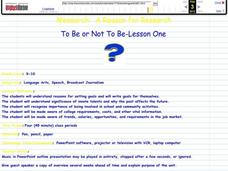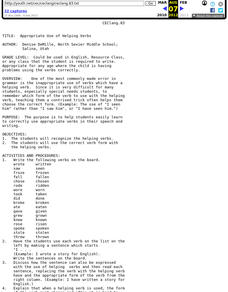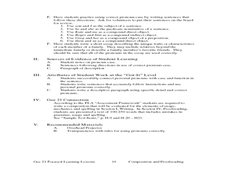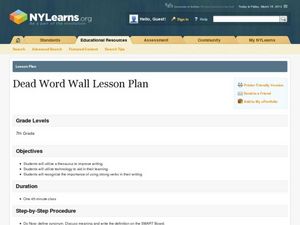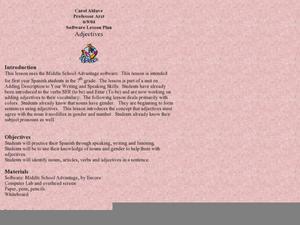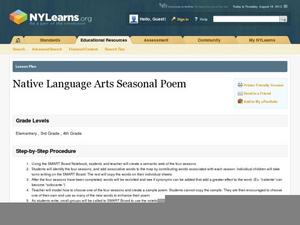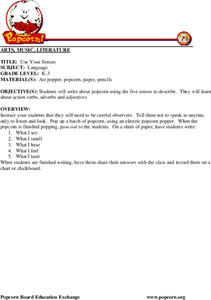Curated OER
Mission Makeover
Young scholars examine their prior knowledge of the space program. After reading an article, they explore the conclusions of the Columbia accident. In groups, they research various space programs and discover the scope of NASA. They...
Curated OER
Power of Speech
Young scholars practice giving compliments and using words of praise. In this vocabulary lesson, students listen to the parable Yettle's Feathers and determine ways to use speech in positive ways instead of through rumors, tattling and...
Curated OER
To Be or Not to Be
Students gather information about setting goals through a variety of activities. In this setting goals lesson, students view a PowerPoint that explains the outcomes of the project, take notes, interview a local business person, write a...
Curated OER
Editorial Writing: What's On Your Mind
Young scholars write an editorial column for a newspaper. For this journalism lesson plan, students discuss and analyze editorials in print and broadcast media. Young scholars will compare the differences in these two formats...
Curated OER
Teachers.Net Toy Parade (Elementary, Reading/Writing
Children bring in a toy, favorite or otherwise, and describe it using adjectives and adverbs. They fold a piece of paper into two columns, and list the adjectives on one side, and the adverbs on the other.
Curated OER
Appropriate Use of Helping Verbs
Readers of all ages correctly use appropriate verbs in their speech and writing. The focus of this lesson is on the proper use of helping verbs.
Curated OER
Adjectives, Adverbs and Advertising
Students identify adjectives and adverbs and be able to use them correctly in a Christmas-related creative writing project. They work in pairs to cut out ads from a magazine to classify them as adjectives and adverbs.
Bright Hub Education
Jabberwocky - A Creative Writing Lesson Plan
Make some sense out of Lewis Carroll's famous nonsense poem "Jabberwocky." After reading through the poem, introduce the word portmanteau and send small groups off to alter the original poem.
Curated OER
Writing Skills: Fables
Use fables as a fun way for English Language Learners to gain confidence and fluency in their reading and speaking skills. After reading a fable in class, they retell their story to a group of their peers. When this jigsaw activity is...
Curated OER
Using Personal Pronouns Correctly
Complete personal pronoun practice activities. Pupils use correct personal pronoun form in sentences the teacher writes on the board. They review the function of a pronoun and the various cases and practice placing personal pronouns by...
Curated OER
Dead Word Wall Lesson
Help your writers eliminate "dead words" (words that are overused) from their writing. This lesson includes a SMART board presentation that will guide them through identifying, eliminating, and substituting "dead words" from sample...
Curated OER
Three-Meal Weather: Food inspired adjectives from "Cloudy with a Chance of Meatballs"
Students complete a list of food adjectives based on the book Cloudy With A Chance of Meatballs. In this adjectives lesson plan, students also compose a 3 part piece of writing based on an entire day of raining food.
Curated OER
Analyzing Word Use Through Guided Wordle
Even though this lesson is just a basic way to review verb usage, it takes a novel approach. First, pupils identify verbs that they use too often in their writing, and then they create a Wordle. Wordle is a website that provides graphic...
Curated OER
Software Lesson Plan
While this plan uses Middle School Advantage software by Encore, you could still use the attached worksheet if you don't have access to the program. Encourage Spanish learners to work with different adjectives and write descriptive...
Curated OER
Native Language Arts Seasonal Poem
Intended for native Spanish speakers, this plan provides an opportunity to create a class semantic web describing the different seasons and listen to Vivaldi's "Four Seasons." Learners will work together to revise their semantic webs,...
Curated OER
Use Your Senses
Students use their five senses to write about popcorn to share with the class. The study the use of action verbs, adverbs,, and adjectives.
Curated OER
Animal Adjectives
In this reading and writing worksheet, students read 3 stories about farm animals that have acted intelligently or even heroically. Students think of 2 adjectives that describe the animal in the story and write them on the lines.
Curated OER
Similes with Energy
Fifth graders write or dance a simile to show the relationship between two unlike nouns. For this simile and grammar lesson, 5th graders explore dance movements and identify smooth and sharp energy examples. Students...
Curated OER
Pornography Debate
Present your seniors with a controversial topic while studying the first amendment: pornography. This multi-layer resource has scholars writing a pros and cons research paper. They also attend a city council meeting to prepare for an...
Curated OER
J'ai mal à la tête! (I have a headache!) -- Health Expressions in French
Oh, no! Everyone is getting sick! Young French speakers use French expressions regarding physical health, some of which are idioms. With the use of health expressions provided in the lesson plan, pairs work together to write stories that...
Curated OER
Sssssssss
Students experience the strategy of phoneme recognition to recognize /s/ in spoken words, including plurals, and in writing. They encounter the book Summer Fun by Lucy Lawrence and the tongue twister "Miss Sam saw a sneaky slimy snake in...
Curated OER
Noun Recognition Practice #2
In this nouns worksheet, young scholars analyze ten sentences and look for the words that name a person, place, thing, or idea. Students write down all the nouns they see in the sentences.
Curated OER
Indirect Object- Direct Object Recognition Practice
In this nouns in sentences worksheet, students first read about the difference between direct and indirect objects. Students read ten sentences and write down the indirect and the direct object.
Curated OER
Noun Recognition Practice #1
In this nouns worksheet, students learn to recognize nouns in sentences. Students read ten sentences and look for the person or place or thing. Students write down the nouns they find in each sentence.


